When you were in school, math was either a thing of beauty or a thing of torment. Whichever it was for you, as a homeschooling parent, you get to help your children move towards an understanding of math—whether they end up doing nothing more than tracking their spending as an adult, or get a doctorate in applied mathematics. Knowing this, how does one go about choosing the best math curriculum?
Let's look at the big questions common to parents choosing a homeschool math curriculum:
- What is the best homeschool math program?
- How do you choose the right math curriculum?
- Is X program better than Y program?
- How do you know when it’s time to change programs?
- How can I make homeschool math fun?
- How do you teach something you don’t know very well yourself?
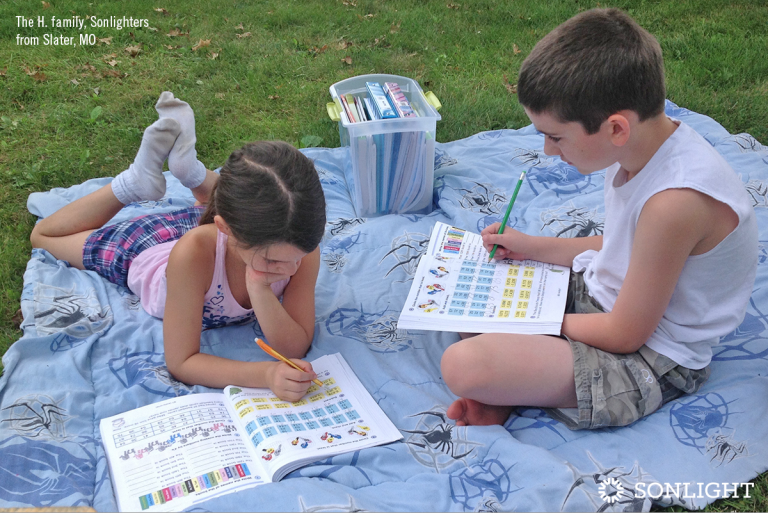
Continue reading below or listen here:
1. What Is the Best Homeschool Math Program?
It’s hard to narrow down an answer with a single best program because children have different needs and learning preferences. However, here at Sonlight, we recommend these six time-tested homeschool favorites. These are what we consider to be the absolute best, can’t-go-wrong homeschool math options:
- Math-U-See
- Singapore Math
- Horizons Math
- Miquon Math
- Saxon Math
- RightStart Math
Young people have succeeded with all of these most popular math programs. So once you’ve narrowed your choices to these top programs, the question isn’t “Is this a good program?” or “What is the best homeschool math curriculum?” They all are excellent choices! The best math is the one that suits your child!
2. Is Saxon Math Better than Singapore Math?
If we take the top programs listed above, we could pit each one against the other and come up with 90 different Program X versus Program Y comparisons.
- Is Saxon Math better than Singapore Math?
- Is RightStart Math better than Miquon Math?
- Is Horizons Math better than Math-U-See?
- And on and on ...
But again, the answer is both yes and no because they are all excellent homeschool curriculum choices. So Saxon Math curriculum is better than Singapore for families who want a spiral approach that they can use from elementary all the way through high school. But Singapore Math is better for the parent who is more math-confident and wants to teach stronger mental math skills.
There are moms who rave about Singapore Math and other moms who swear by RightStart Math. Both have chosen their ideal program...for certain years, for particular children.
The key is not to ask which program is objectively better, but which program is better for certain situations or kinds of kids:
- The best math for a visual learner
- The best math for a struggling math student
- The best elementary math curriculum
- The best high school math curriculum
- The best math for a child who is missing basic math skills
- The best math for a child who needs tons of practice
- The best math for a child who abhors excessive repetition
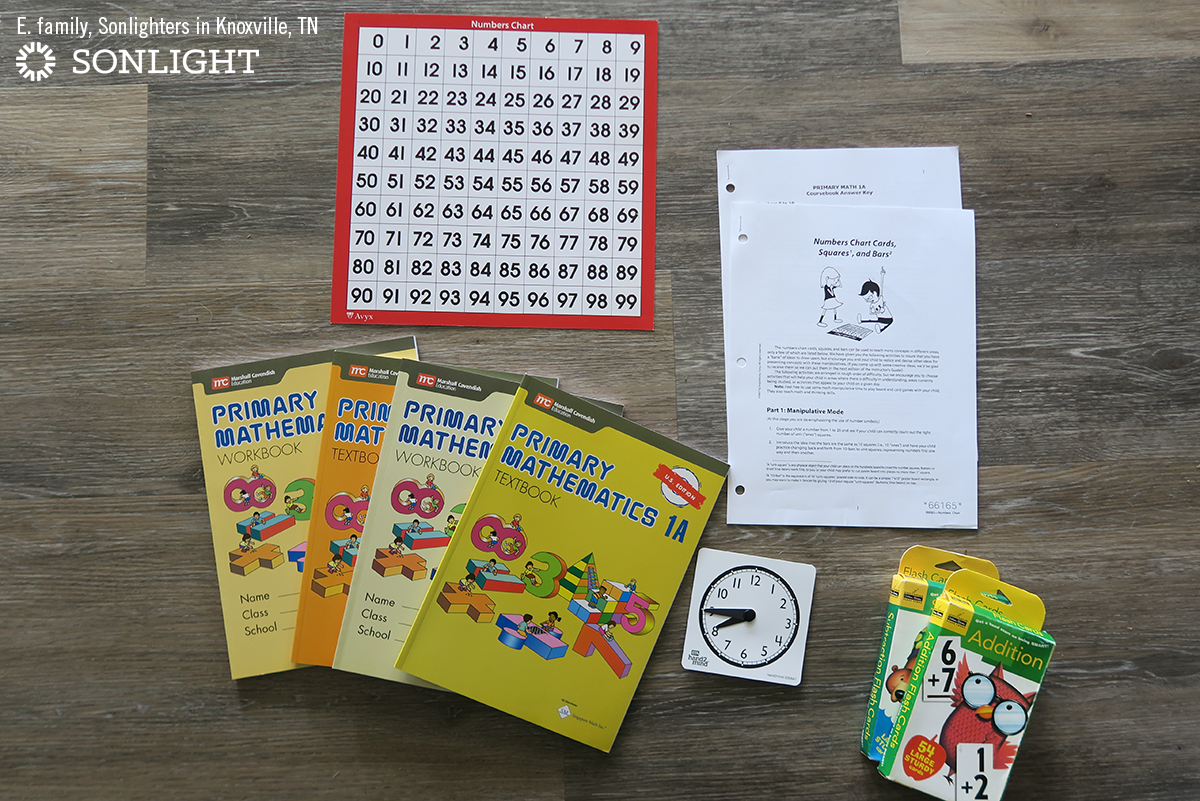
3. So How Do I Choose the Right Math Curriculum?
When it comes to choosing the best homeschool math curriculum, the issue is, “Is this a good program for me and my children?” So do a little evaluation of your preferences as you consider how to choose the right math curriculum.
Video and Computer Instruction
If you like video lessons where you, the parent, don’t have to do all the teaching, Math-U-See might be a great choice for you, as Mr. Demme’s instruction is both charming and thorough. Alternately, Saxon offers DIVE CDs from 5/4 and up.
But if you know that you prefer your children to avoid screens, these programs are going to frustrate you. So choose something else.
Experimentation
Think about your early elementary children. Do they just want the instructions so they can get onto the next thing as quickly as possible? Or do they like to play, experiment, and try new things? Neither of these is bad; each is just a personal preference.
If your children like to follow the rules, Miquon is not going to be a good program for them. Miquon is ideal for children who are outside-the-box thinkers. It grows number literacy in incredible ways and allows for great success . . . but only if your children enjoy it to begin with.
Math Confidence
How confident are you in math? Some of the best math students in the world come from Singapore, and Singapore Math is both easy to use and thorough. It is based on combining numbers to make 10 (since adding 10+5 is easier than 7+8). If you aren’t already confident in math, this may not a good option for you. You can either commit to learning along with your child, or you may want to try something more traditional like Horizons Math or Saxon Math.
Math Through High School
When choosing your best elementary math curriculum, think ahead to the later years of middle school and high school.
If you suspect you’ll be homeschooling through high school, and would prefer to use one program all the way through, you’re looking at either Math-U-See or Saxon.
Miquon goes only through early elementary. Singapore goes through middle school, but you can find the NEM program elsewhere if you choose to carry on past 8th grade. Horizons also does not go through all high school levels. You can transition to a different program for algebra and beyond! However, if picking a new program later sounds stressful, then choose between Math-U-See and Saxon for a seamless experience.
What Is the Best Homeschool Geometry Curriculum?
There’s a quirk about Saxon Math you’ll want to know: Geometry is not its own individual course. Instead, geometry is taught across three other Saxon levels: Algebra 1, Algebra 2, and Advanced Math.
Our recommendation for a standalone geometry curriculum is Math-U-See Geometry Universal Set.
Math Manipulatives
What do you think about manipulatives, the rods, blocks, or other tangible tools that your children physically move around in order to solve problems?
Concrete (not abstract) thinking is the dominant cognitive mode for children until around age seven, though it can be helpful on occasion in the older grades. For example, think of how much easier fractions are to understand when you can visualize a pie. This is why Ruth Beechick in The Three R’s recommends parents use a program with manipulatives especially in the younger grades.
The three programs that rely heavily on manipulatives are
In Horizons Math, manipulatives are optional. Singapore doesn’t use manipulatives at all, though you can certainly add them. Recommendations for doing so are included in the Home Instructor's Guides.
Color and Layout
Do your children enjoy bright, colorful worksheets? Horizons Math has color worksheets. Singapore has cheerful color illustrations in their teaching books, but black and white worksheets. Most other programs are entirely black and white, which is excellent for children who may be overstimulated with lots of colors.
Teacher Scripts
Would you feel more comfortable doing something scripted, where your words are written out for you? Horizons and Saxon are both good options for you. Or, if you are confident enough to teach with lesson plans, Miquon and Singapore can work for you.
Cost, Parent Involvement, Common Core
The math comparison chart here has sortable headers with additional features such as price, how parent intensive it is, and whether or not it meets Common Core standards.
Research the Programs
After thinking about who your children are, it’s time to start researching the programs that you are still considering. Read about the homeschool math curriculum options they offer. Look at samples of the specific products you are thinking about, then go with your intuition.
If two programs sound equally good, often it’s helpful to talk it all through. You can chat with one of our experienced advisors who may be able to offer additional insight. In the end, if one doesn't seem to be better than the other, then choose one and try it.
Of course, if you like social proof, go with Math-U-See. This program is more popular than all the others combined.
Keep in mind, especially if your children are young, that the math program you choose needs to be something you are happy to teach. If you like the program, you’ll be comfortable working with your children to help them succeed. But if you don’t particularly like it, you’re going to find it much easier to skip a day. As you probably know, over time, that contributes to a feeling of failure, not to mention falling behind in an important subject.
Make a Choice
Choose the program that looks best to you. Sometimes you may need to find a YouTube video to explain a concept, or sometimes you can allow your children to skip ten lessons because you know they know the content. You have the freedom to do that.
When you have clarity enough, have your children take a placement test. We have one for each math program we carry. Ideally, you’ll offer these to your children before ordering so you know what level to buy. Also, taking the tests can help you get a feel for a program so you know whether the style seems to suit you.
When it’s time to buy, will you be confident in your math purchase? Perhaps not entirely. But you’re going for clarity enough, not complete confidence. Pray for wisdom, and then act. You can do it.
4. How Do You Know When to Change Math Curriculum?
A good rule of thumb is, “If what you’re using isn’t broken, don’t change.” It’s kind of like buying a camera or a new phone—don’t bother to upgrade unless you can state clearly what the latest camera or phone will do for you.
I know it can be intimidating when you talk to a friend who gushes about her program, and you think, “Well, our program worked really well for us this last year, but do I have the same emotional attachment to math that she does? No. Maybe I should switch.”
If your gut says you should switch, go for it. But otherwise, it might just be like when a friend raves about a movie and you watch it and think, “Hmm. We have different taste.” So with math. If it’s a matter of emotional attachment, maybe don’t use that as your criteria to choose the best homeschool math curriculum.
The Best Homeschool Math Curriculum for Struggling Students
That said, don't be afraid to change math programs if you pick one and it doesn't work out. You don’t want your child to struggle to the point of feeling like a math failure. Those early messages we learn about our proficiency with math can haunt us throughout our lives! Make sure your struggling student finds success with math by switching to a different program if yours is flopping.
Use what you've learned from teaching your student to help you pick a new program that will better meet your needs. Where does the struggle lie? You can start the research process again if you know what specific problem you’re trying to solve:
- This program teaches fractions in a way I find horribly convoluted.
- I think my child is getting distracted by color illustrations.
- There is not enough practice.
- There is too little repetition of older facts.
- The lessons are too abstract. My child needs concrete examples/manipulatives.
- My child has not mastered the basics.
It’s not a big deal to change. If you need to, just do it. No guilt. You’re doing the best you can for your children. You did that with the first program you chose. You’re doing it now. Make course corrections if needed, but keep the course if not.
5. How Do You Teach Math When You Don't Understand It?
The short answer is: you don’t need to know it all. You just need to know a little more than your student. If you need to go back to the beginning and start anew, do what it takes.
Having said that, if math is, and always has been, a struggle for you, you might have undiagnosed dyscalculia. A quick internet search suggests that dyscalculia may be as common as dyslexia but not as widely known. If your brain is not organized to manage numbers, it just isn’t. You should have no shame over that.
If you suspect you struggle with dyscalculia, or if you are generally stressed about teaching math, you have options.
- You can pick a program that offers instruction as part of the program, like Math-U-See.
- You can ask a spouse or grandparent for help.
- You can hire an outside tutoring service or join a co-op.
What About Skipping Math in Elementary Years?
Not everyone believes that math in elementary school is helpful. Louis P. Bénézet conducted a fascinating experiment, published in 1935. As a superintendent of a school district, he took some of the elementary schools and instructed the teachers that the children should be taught to read, reason, and recite—with no concentrated math instruction!—until 7th grade. (Meaning, if a teacher needed to approximate a distance as she told a story, she would. But she did not have a time set aside for measuring, and the students didn’t go through math workbooks.)
These students, without studying math until seventh grade, ended up far better able to calculate and think mathematically than their more traditionally educated peers.
If you want to know more, you can find numerous articles online, or read his actual report here (PDF).
Maybe your own math fears or distaste come from being forced to learn math before you were ready! Consider your child’s developmental readiness when starting with math instruction. Early is not always better!
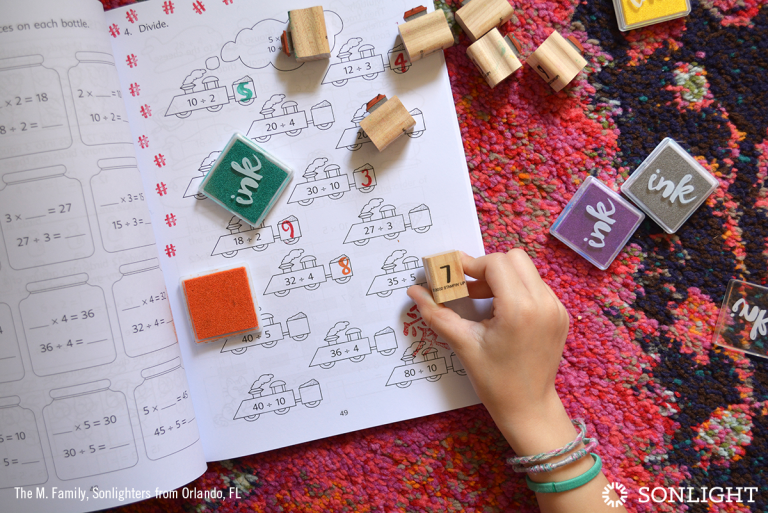
6. How Can I Make Homeschool Math Fun?
One of the core position statements of the National Council of Teachers of Mathematics is
“to ... build in each student a positive mathematical identity and a sense of agency.” Certainly this is our goal as homeschool parents, too! Making math fun erases the negative self-talk that says, “I’m not good at math.”
1. Play Math Games
Across the board, kids typically love games. So any time you can teach or practice math through dice, cards, board games, active games, etc., go for it!
If the math workbook causes dread, simply modify the topic for your homeschool lesson into a game. Repurpose generic board games like Candy Land or make your own. Get your kids involved in creating the game itself: choosing tokens, designing playing cards, coloring a game board, etc.
If games are your favorite way to teach, RightStart Math incorporates them into the program.
2. Inject Math Variety
Add novelty to practice. Sometimes all it takes to make math more enjoyable is to simply switch up the method, the place, or the tool.
- Jump on numbered squares marked out with tape or sidewalk chalk instead of writing down the answers.
- Do computation with dry erase markers on the sliding glass door or window instead of writing on paper.
- Read the Life of Fred books.
- Use MathTacular! DVDs (Learn more from this MathTacular review)
Need inspiration? Take a stroll through the crafts section of your favorite box store and look at each object with an eye to how it could be used to explore math! Watch how your kids play outside and consider how their physical fun could be leveraged for enjoyable math play.
3. Memorize Math Facts
If a child has no mastery of the basics, math simply grows more and more frustrating. Work on memorizing facts through songs, rhymes, chants, body motions…whatever it takes.
4. Focus on the Process
For creative right-brained children, the absolute nature of finding a single right answer can be infuriating. It’s doubly frustrating when a small computational error results in the wrong answer.
Help kids see that while there may be one answer, there are multiple ways to get there. Allow them to explore and find those avenues. And praise their math thinking even when they don’t get to the right answer. Basically, focus on the process over the product so that math can become more playful.
More to Read About Making Math Enjoyable
- Fun Tricks for Memorizing the Values of Math-U-See Blocks
- 7 Hints for Keeping Math Time Tear-Free
- 3 Outside-the-box Learning Activities When You Need a Day of Fun
Next Steps for Choosing a Homeschool Math Curriculum
Ready to make the leap and choose a math program? Research your math curriculum options, use the placement tests, connect with an Advisor for peace of mind, and make a decision.
We wish you all the best as you choose your best homeschool math curriculum.


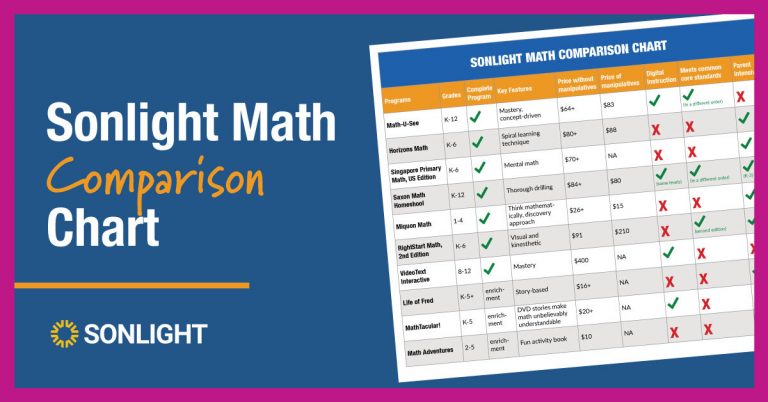
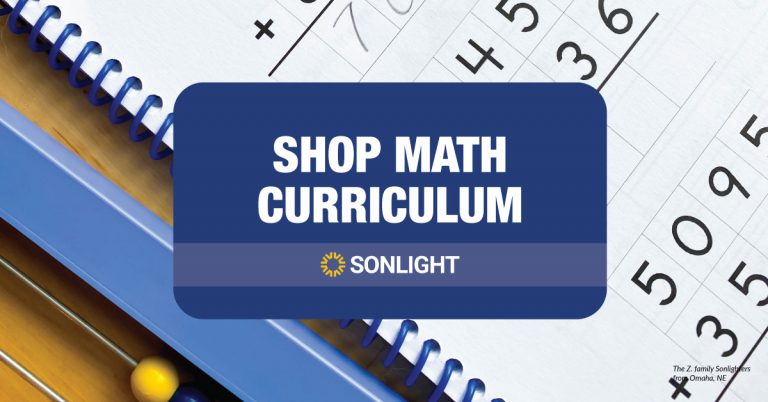

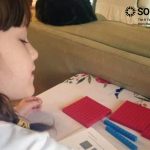
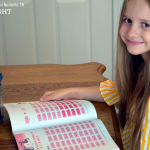


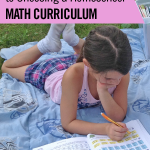
I first came across the existence of Sonlight nine years ago after landing on your website while doing research on different math curricula. I eventually ended up ordering Miquon Math and requested your catalog. We've been a Sonlight family ever since. All four of my children used Miquon during their early elementary years and I've always been grateful that Sonlight introduced me to this unique program. In all my homeschooling years, I've never even met another family who had tried it.